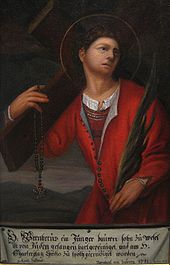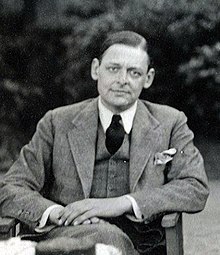1996 ⟶ T.S. Eliot Accused of Antisemitism
The depiction of Jews in some of T.S. Eliot's poems has led ...Year
1833
1909
1933
1934
1967
1996
📖 Publication of Clemens Brentano's Antisemitic 'Dolorous Passion'
Clemens Brentano published The Dolorous Passion of Our Lord Jesus Christ According to the Meditations of Anne Catherine Emmerich. The "Dolorous Passion" is claimed to reveal a "clear antisemitic strain throughout", with Brentano writing that Emmerich believed that "Jews ... strangled Christian children and used their blood for all sorts of suspicious and diabolical practices."⟶

AntisemitismBlood LibelReligious Anti-SemitismIdeology19th CenturyLiteratureAnne Catherine Emmerich
 Germany
Germany📢 Emergence of New Antisemitism
Salomon Reinach and Florence Simmonds refer to "this new antisemitism, masquerading as patriotism, which was first propagated at Berlin by the court chaplain Stöcker, with the connivance of Bismarck." Similarly, Peter N. Stearns comments that "the ideology behind the new anti-Semitism was more racist than religious."⟶

AntisemitismNew AntisemitismRacismIdeologyEarly 20th CenturyPolitical AntisemitismBismarck
 Germany
Germany🗣️ T.S. Eliot's Anti-Jewish Remarks in Lectures
In a series of lectures delivered at the University of Virginia in 1933, published under the title After Strange Gods: A Primer of Modern Heresy (1934), T.S. Eliot wrote of societal tradition and coherence, "What is still more important is unity of religious background, and reasons of race and religion combine to make any large number of free-thinking Jews undesirable." Eliot never re-published this book/lecture.:⟶

AntisemitismIdeologyIntellectualsT.S. EliotHeresyCultural homogeneityModernism
 United States
United States🎭 T.S. Eliot's Caricature of Fascists in "The Rock"
In his 1934 pageant play The Rock, T.S. Eliot distances himself from Fascist movements of the thirties by caricaturing Oswald Mosley's Blackshirts, who 'firmly refuse/ To descend to palaver with anthropoid Jews'. The "new evangels" of totalitarianism are presented as antithetical to the spirit of Christianity.⟶

AntisemitismIdeologyT.S. EliotFascismBlackshirtsLiterary criticismCaricature
 United Kingdom
United Kingdom✍️ Ezra Pound's Self-Deprecating Remarks
Allen Ginsberg stated that, in a private conversation in 1967, Ezra Pound told the young poet, "my poems don't make sense." He went on to supposedly call himself a "moron", to characterize his writing as "stupid and ignorant", "a mess". Ginsberg reassured Pound that he "had shown us the way", but Pound refused to be mollified:⟶

Pound, EzraPoetryAntisemitismModernismLiterary CriticismGinsberg, AllenLiterature
 United States
United States✍️ T.S. Eliot Accused of Antisemitism
The depiction of Jews in some of T.S. Eliot's poems has led several critics to accuse him of anti-Semitism. This case has been presented most forcefully in a study by Anthony Julius: T. S. Eliot, Anti-Semitism, and Literary Form (1996). In "Gerontion", Eliot writes, in the voice of the poem's elderly narrator, "And the jew squats on the window sill, the owner / Spawned in some estaminet of Antwerp." Another well-known example appears in the poem, "Burbank with a Baedeker: Bleistein with a Cigar". In this poem, Eliot wrote, "The rats are underneath the piles. / The jew is underneath the lot. / Money in furs." Interpreting the line as an indirect comparison of Jews to rats, Julius writes, "The anti-Semitism is unmistakable. It reaches out like a clear signal to the reader." Julius's viewpoint has been supported by literary critics such as Harold Bloom, Christopher Ricks, George Steiner, Tom Paulin and James Fenton.⟶

LiteratureT.S. EliotAntisemitismLiterary CriticismIdeology20th CenturyPoetry